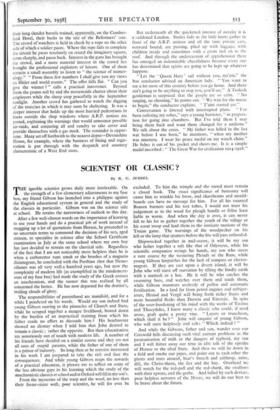SCIENTIST OR CLASSIC ?
By R. G. JESSEL
THE ignoble scientist grows daily more intolerable. On the strength of a few elementary adjustments to my fuse box, my friend Gibson has launched into a philippic against the English educational system in general and the study of the classics in particular. Gibson was on the science side at school. He retains the narrowness of outlook to this day.
After a few well-chosen words on the importance of learning to use your hands and do a practical job of work instead of mugging up a lot of quotations from Horace, he proceeded in no uncertain terms to commend the decision of his son, aged sixteen, to specialise in science after the School Certificate examination in July at the same school where my own boy has just decided to remain on the classical side. Regardless of the fact that I am not noticeably more helpless than he is when a carburettor runs amok or the brushes of a magneto disintegrate, he concluded with the Parthian shot that Demo- sthenes was all very well a hundred years ago, but now the complexity of modern life (as exemplified in the misdemean- ours of my fuse box) had made the study of the Greek orators an anachronism, and the sooner this was realised by all concerned the better. He has now departed for the dentist's, trailing clouds of glory.
The responsibilities of parenthood are manifold, and for a while I pondered on his words. Would my son indeed find young Gibson soaring to the pinnacles of Church and State, while he scraped together a meagre livelihood, bowed down by the burden of an impractical training from which his father made no effort to dissuade him ? His headmaster showed no dismay when I told him that John desired to remain a classic ; rather the opposite. But then educationists are notoriously out of touch with modern life. A number of his friends have decided on a similar course and they are not all sons of stupid parents, while the father of one of them is a prince of industry. So long then as he remains interested in his work I am prepared to take the risk and face the consequences. And while young Gibson reaps the rewards of a practical education, it pleases me to reflect on some of the less obvious gaps in his learning which the study of the anachronistic classics at school and at Oxford will fill in my son's.
From the mysteries of the warp and the woof, no less than their foster-sister weft,- poor scientist, he will for ever be excluded. To him the wimple and the snood must remain a closed book. The exact significance of bottomry will cause him to wrinkle his brow, and sharebeams and mould- boards can have no message for him. For all his vaunted Bunsen burners and his test tubes, I would not trust his judgement as to the wood for plough handle or felloe least liable to worm. And when the day is over, it can never fall to his lot to gather together the youth of the village or his scout troop and lead them in the intricate motions of the Trojan game. The warnings of the woodpecker on his left or the lamp that sputters before the fire will pass unheeded.
Shipwrecked together in mid-ocean, it will be my son who lashes together a raft like that of Odysseus, while his scientific companion wrings his hands, my son who steers a sure course by the westering Pleiads or the Ram, while young Gibson languishes for the lack of compass or electro- magnet. If they are cast upon a desert island, it will be John who will stave off starvation by tilling the kindly earth with a mattock or a hoe. He it will be who catches the swarming bees, and watches over them and tends them, while Gibson murmurs uselessly of pollen and automatic fertilisation. In a land far from petrol engines and refriger- ators, Hesiod and Vergil will bring forth richer fruits and more bountiful flocks than Darwin and Einstein. In spite of the over-burdening of his mind with the works of Tacitus and Thucydides, I know many a classic who could, if need arose, graft quite a pretty vine. " Layers or truncheon, which shall it be ? " John will enquire of young Gibson, who will stare helplessly and ech3 " Which indeed ? "
And while the Gibsons, father and son, wander over our Cotswold hills discussing such vital current problems as the pasteurisation of milk or the dangers of typhoid, my son and I will fritter away our time in idle talk of the epistles of Horace or the ideal State. And then we will lie down in a field and smoke our pipes, and point out to each other the plants and trees around, bear's breech and calthrop, anise, dill, the Christ-thorn, the ilex and the bay. Overhead we will watch for the red-poll and the red-shank, the swallows with their aprons, and the grebe. And lulled by such devices, poor helpless servants of the Muses, we will do our best to be brave about the future.














































 Previous page
Previous page